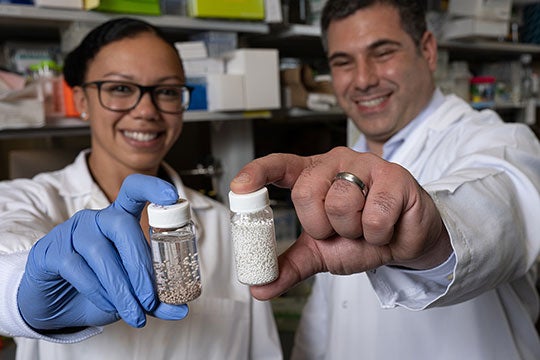 |
| Rice University bioengineers Amanda Nash (left) and Omid Veiseh with vials of bead-like “drug factories.” Photo credit – Rice University Media |
CANCER DIGEST – March 5, 2022 – Implantable 'mini drug factories' have been shown to eliminate tumors in animal models. However, because the materials and the drug used are already FDA approved, the Rice University researchers hope to be able to begin human clinical trials later this year.
The research teams from University of Texas MD Anderson Cancer Center, the University of Virginia and others, led by bioengineers Amanda Nash and Omid Veiseh of Rice University, developed the bead-like 'drug factories' to continuously produce natural compounds that program the immune system to attack tumors.
Aiming first at ovarian cancer, the drug-producing beads were implanted into the ovarian tumors and nearby tissues in mice, thus concentrating the cancer-killing drug within the target area and thereby reducing side effects.
In the study published in the March 2, 2022 edition of Science Advances, a journal of the American Association for the Advancement of Science, the researchers showed that they could tailor the drug delivery that resulted in tumors that were 3 to 7 times smaller than was seen in untreated mice, suggesting that the drug was reversing tumor growth.
"In this study, we demonstrated that the ‘drug factories’ allow regulatable local administration of interleukin-2 and eradication of tumor in several mouse models, which is very exciting," Dr. Amir Jazaeri, professor of gynecologic oncology and reproductive medicine at MD Anderson and co-author of the study said in a press release. "This provides a strong rationale for clinical testing.”
The drug produced by the beads is interleukin 2 a natural compound that activates white blood cells to fight cancer. It has long been used in cancer treatment with limited success because at high doses, IL-2 produces intolerable side effects.
“If you gave the same concentration of the protein through an IV pump, it would be extremely toxic,” Nash said in a press release. “With the drug factories, the concentration we see elsewhere in the body, away from the tumor site, is actually lower than what patients have to tolerate with IV treatments. The high concentration is only at the tumor site.”
The treatment is being developed Avenge Bio, a Massachusetts-based startup co-founded by Veiseh, which has licensed the cytokine-factory technology from Rice University.
The study was funded by the Cancer Prevention Research Institute of Texas (RR160047), Avenge Bio, the Emerson Collective, the Welch Foundation, the Rice University Academy of Fellows, the National Science Foundation (1842494) and the National Institutes of Health (R01DK120459).
"In this study, we demonstrated that the ‘drug factories’ allow regulatable local administration of interleukin-2 and eradication of tumor in several mouse models, which is very exciting," Dr. Amir Jazaeri, professor of gynecologic oncology and reproductive medicine at MD Anderson and co-author of the study said in a press release. "This provides a strong rationale for clinical testing.”
The drug produced by the beads is interleukin 2 a natural compound that activates white blood cells to fight cancer. It has long been used in cancer treatment with limited success because at high doses, IL-2 produces intolerable side effects.
“If you gave the same concentration of the protein through an IV pump, it would be extremely toxic,” Nash said in a press release. “With the drug factories, the concentration we see elsewhere in the body, away from the tumor site, is actually lower than what patients have to tolerate with IV treatments. The high concentration is only at the tumor site.”
The treatment is being developed Avenge Bio, a Massachusetts-based startup co-founded by Veiseh, which has licensed the cytokine-factory technology from Rice University.
The study was funded by the Cancer Prevention Research Institute of Texas (RR160047), Avenge Bio, the Emerson Collective, the Welch Foundation, the Rice University Academy of Fellows, the National Science Foundation (1842494) and the National Institutes of Health (R01DK120459).
Sources: Rice University press release and ScienceAdvances


No comments:
Post a Comment